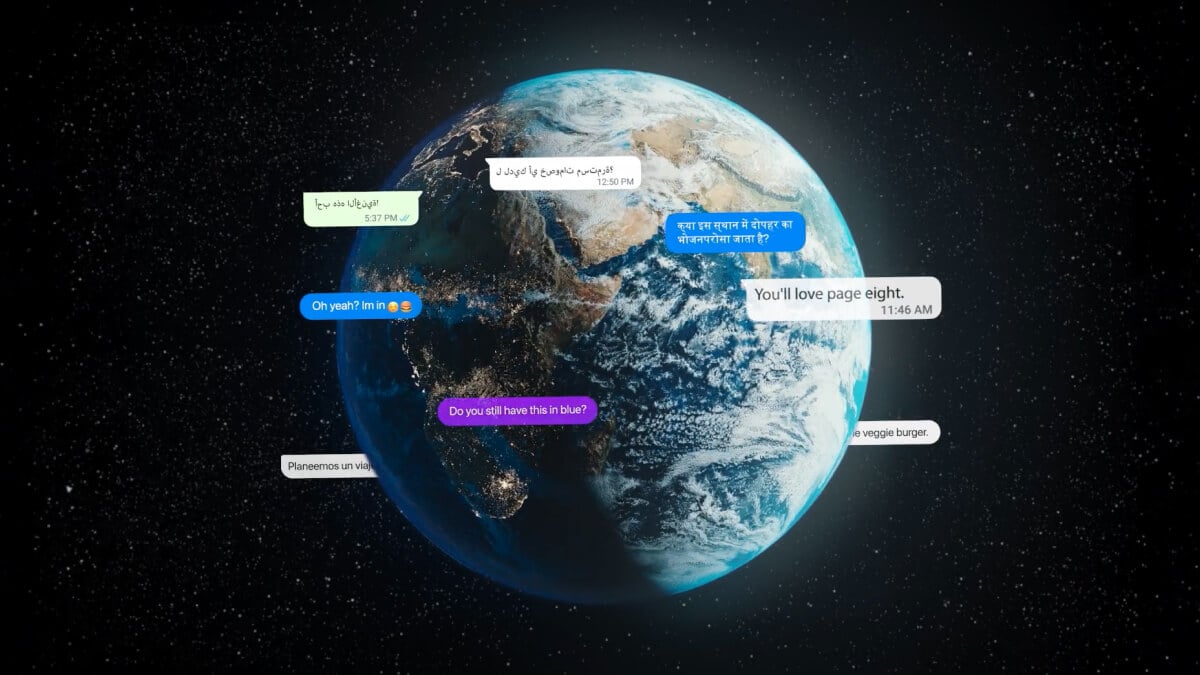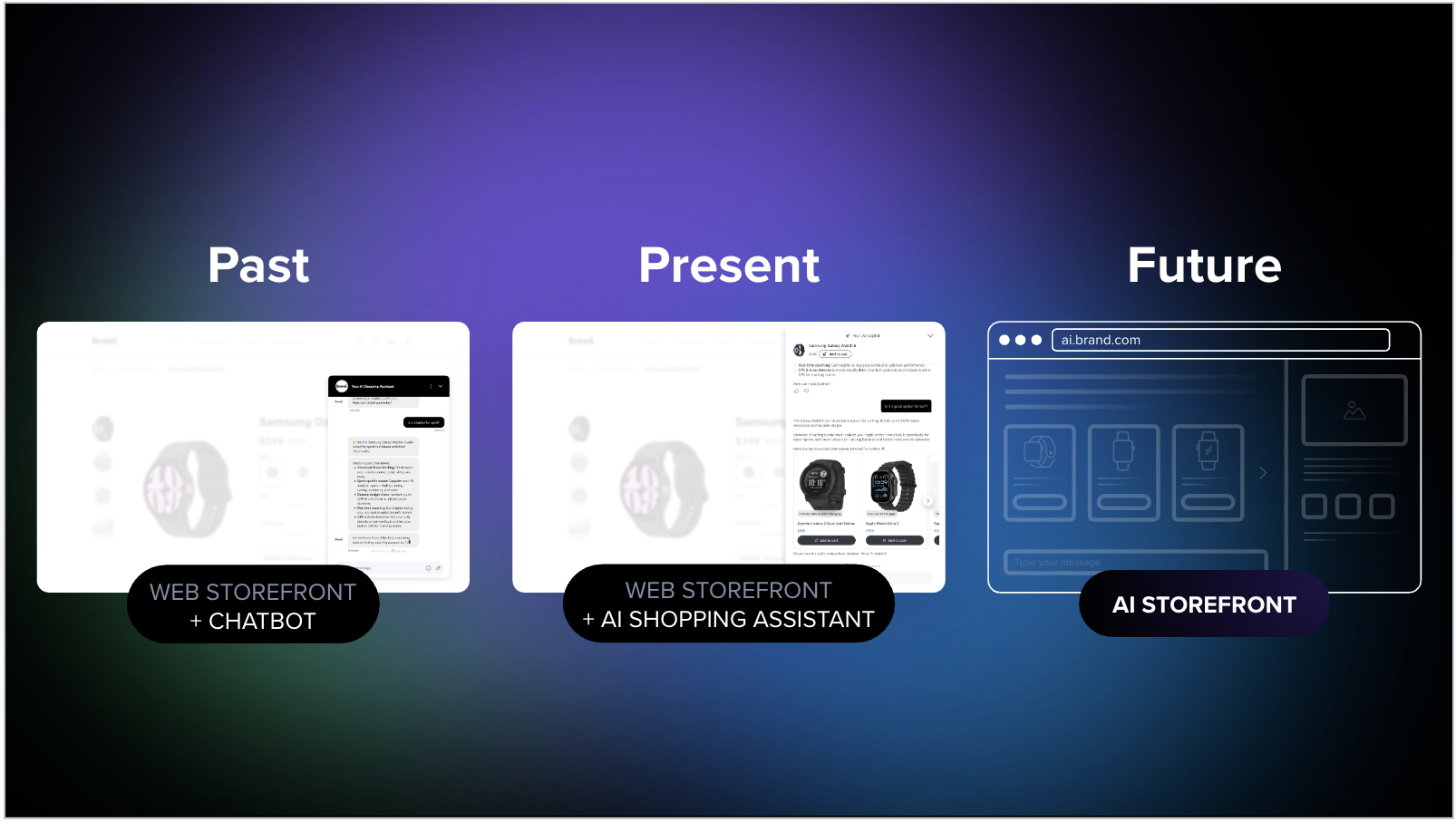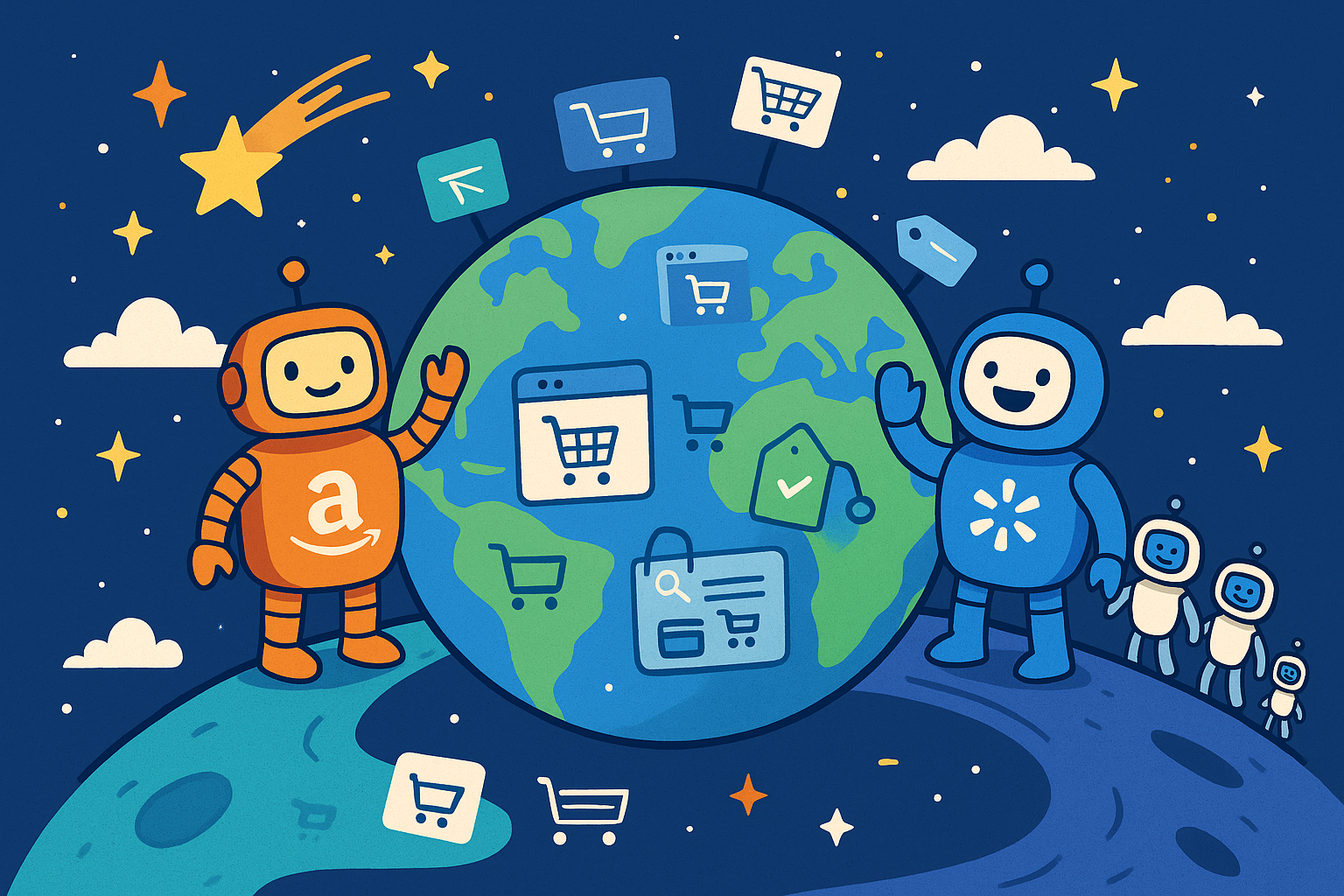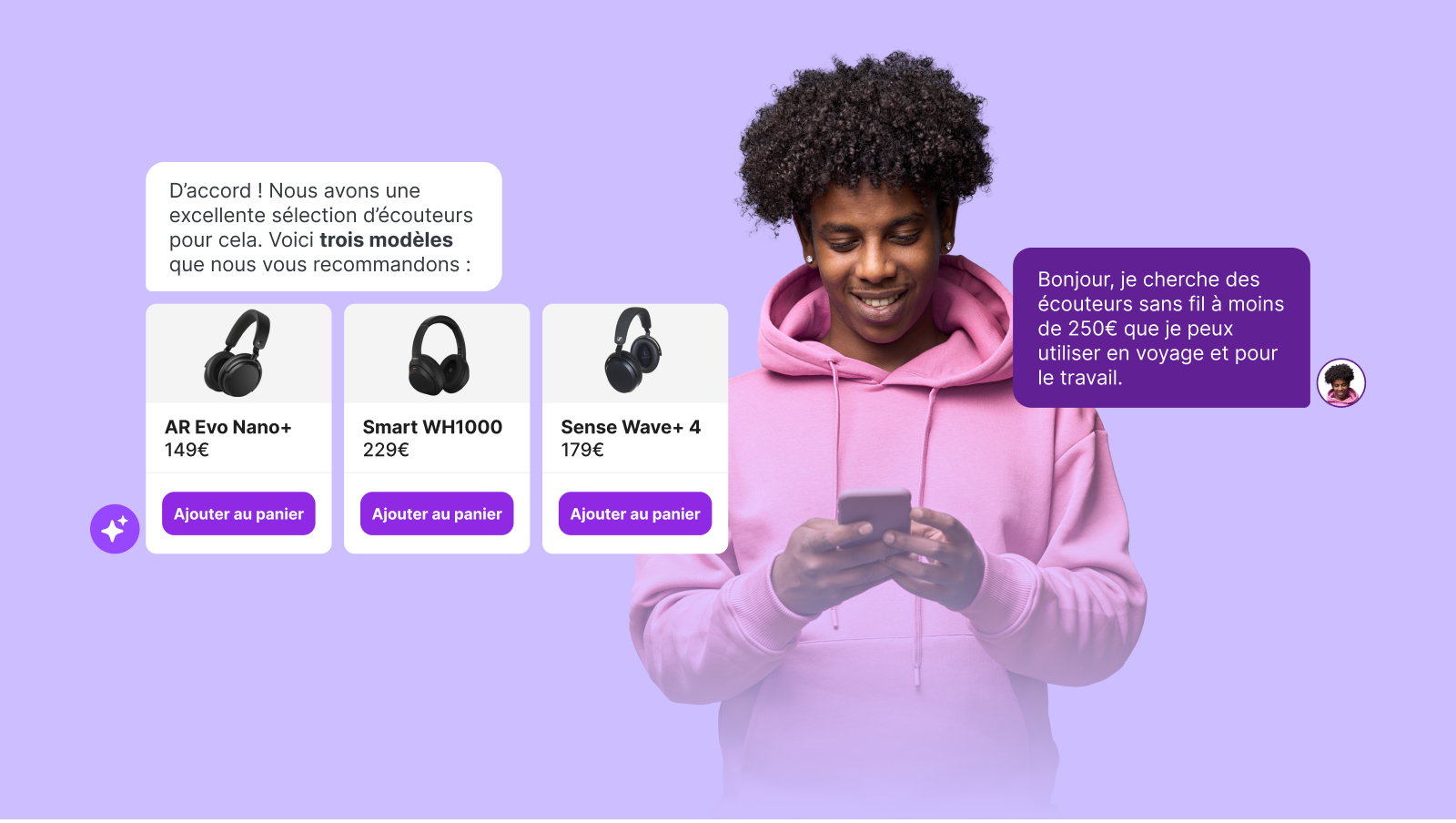Meta Conversations: The Future of Commerce is Conversational
iAdvize

On May 19, 2022, Meta held the first ever event dedicated to the future of business-to-customer communication. The event, aptly titled Conversations, highlighted the centrality of messaging as a global cultural phenomenon in the digital transformation of business and commerce.
"The best experiences with companies take place where people are." - Mark Zuckerberg, CEO of Meta
He was referring to messaging apps. This is a vision we’ve championed since our inception through our solutions for businesses and our mission to make brands conversational. Let's explore 4 key takeaways from the event.
1. Messaging is at the heart of a company’s digital transformation.
In just 10 years, messaging has transformed billions of peoples’ lives around the world. We share our daily happenings, thoughts, and memories through text, calls, photos, and video messages. We are connected to each other through these threads of conversation—our lives are conversational. To keep up with ever-evolving customer expectations, businesses must embrace this messaging revolution and offer their consumers the opportunity to connect with them on their preferred communication channels.
Messaging has become the center of our digital lives. [...] More and more, consumers want the same ease of communication with businesses.
-- Mark Zuckerberg, CEO of Meta
Facebook Messenger, WhatsApp, Instagram Direct—according to Meta, more than one billion users log in to a corporate account each week via its messaging services. And yet, many brands still offer phone and email as their primary means of contact, modes of communication that are neither cost-effective or efficient, nor popular with customers.
"People don't want to call customer service, log into an app or send an email. [...] They want to get help and make purchases directly through chat." - Mark Zuckerberg, CEO of Meta
Meta presented some illuminating data to support this point:
- 7 out of 10 people feel more connected to the companies they can contact via messaging.
- More than 65% of consumers prefer messaging to email and phone contact.
The conclusion is clear: messaging is the cornerstone of a company’s ability to digitally transform. The American social metaverse giant notes that brands who make the switch are reaping the benefits, including:
- Improved customer satisfaction
- Increased advisor efficiency through conversational automation and artificial intelligence capabilities
- Accelerated online sales; for example, C&A Brazil generates 50% of its online sales on WhatsApp alone
2. Conversational commerce is the new norm.
Messaging is a powerful tool for engagement and conversion. Indicators across the Atlantic show that online conversation has become essential for e-commerce in recent years:
Against this backdrop, Meta has made a major product announcement: They opened their WhatsApp Business API to small and medium-sized businesses through their WhatsApp Cloud API innovation. While the WhatsApp Business API was previously limited to large enterprises via official partners like iAdvize, the instant messaging app with over two billion active users will now be available for businesses around the world to advise their online shoppers and sell products.
We're creating conversational commerce capabilities to select products, add them to a cart and purchase; we're creating new ways to engage and re-engage customers.
-- Emile Litvak, Business Messaging & Vice President at Meta
3. Messaging services take priority over applications.
Meta wants consumers to be able to contact brands without needing to download or connect to an app, instead doing so from the everyday tools already at their fingertips on their smartphones.
"80% of customer service organizations said they will abandon native mobile apps in favor of messaging on third-party platforms by 2025." Gartner
Meta demonstrated this idea by inviting the CEO of Uber, Dara Khosrowshahi, on stage to talk about a test the company conducted in India. They gave users the ability to book a ride directly through WhatsApp (used by 487 million Indians). The results were remarkable: a third of people who booked a ride through messaging were new users. This not only provided Uber with an entirely new community of customers, but also encouraged the company to extend to other territories.
Will third-party messaging platforms replace native mobile applications for online commerce and customer service? Meta's strategy is to convince companies that this reality is inevitable, but with D2C logic, brands will certainly be reluctant to entrust their customer data and insights to Meta entirely.
At iAdvize, we believe in the cohabitation of the two media—third-party messaging applications and native digital channels (live chat and in-app)—to offer prospects the communication medium of their choice throughout the customer journey. This includes an integrated messaging system that allows the consumer to remain on the site and in the brand's universe. At the same time, the optimization of the mobile experience, through a mobile-first approach, is essential to meet current needs and uses.
Whether through WhatsApp, Messenger, chat, calls, emails, when you’re a large company receiving thousands of messages daily, delivering an omnichannel and personalized experience at scale is a grueling challenge.This is the mission that AI-powered conversational platforms like iAdvize are purpose-driven to fulfill. Subsequently, this is also the idea behind Meta's second major product announcement: The acquisition of a messaging-first CRM platform, Kustomer.
I believe the future of customer service lies in a customer-first messaging platform, encompassing the applications people use the most. [...] It brings together customer conversations from every channel into a unified view on a single screen.
-- Brad Birnbaum, VP of Kustomer at Meta
4. Proactive customer service is the next big thing.
"Messaging will transform the way we communicate with businesses. It is already revolutionizing customer service." - Matt Idema, VP, Business Messaging at Meta
Just like how purchases can now be made directly in chat or via messaging, consumer issues should be resolved in a single conversation thread. Companies should enlist automation where possible to provide responsive, around the clock, personalized conversational customer service.
Meta takes this one step further by introducing the notion of proactive customer service, which they define as addressing customers before they even realize their problem, thereby significantly improving customer satisfaction.
This is the vision that Brad Birnbaum, VP of Kustomer, demonstrated through an example of a food delivery service that would automatically message a customer to inform them of the unavailability of an ingredient and propose alternative options. In the future, this customer would then proactively receive a message offering them new menus to try in their favorite restaurants. Thus introducing a new, fully personalized form of engagement.
The brands that will differentiate themselves will be the ones that treat people like people, not tickets.
-- Brad Birnbaum, VP Kustomer at Meta
In line with WhatsApp Push Notifications, Meta announced plans to promote proactive customer support on Messenger and Instagram Direct. The goal is to allow businesses to send recurring notifications to their customers directly in their chat feed, while letting them decide how often (weekly, monthly, etc.) they want to be contacted.
According to Meta, proactive messaging is the perfect solution to solving a low email open rate and the lack of flexibility with SMS.
- Click-through rate is 3.5x more with messaging vs. SMS
- Click-through rate is 20x more with messaging vs. email
The "Recurring Notifications" feature is already available on Messenger API and will be available on Instagram Direct this fall. As is currently the case with WhatsApp, it will be paid for by businesses.
Make conversation the cornerstone of your e-commerce strategy with iAdvize.
Our 360° conversational platform allows brands to bring authenticity, interactivity, and personalization to their digital journey without sacrificing scalability. Augmented Intelligence works at all stages of the customer journey to connect visitors via messaging (text, voice, video chat) with the most relevant respondent, like intelligent chatbots, independent experts, in-store salespeople, or customer service advisors.
Whether your customers contact you through chat, SMS, Twitter, WhatsApp, Messenger, or Apple Messages for Business, your advisors receive all messages in a unified way, within a single interface. This global conversational experience breaks through traditional boundaries between the physical and digital customer journey and can be deployed by:
- Automated and proactive engagement
- Salespeople connected by video chat
- Customer service augmented by AI
- Proactive conversational customer support
The conversational brand is where consumer expectation is trending. Are you ready to join the conversation?

.png)
.png)







